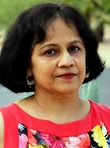Sudha Balagopal's Blog, page 3
August 2, 2016
Knowledge Should be Free
As far back as I can remember, libraries have been a part of my life. They evoke several emotions: wonderment, knowledge, comfort, warmth, and an escape into the hitherto unknown.
I recall walking to the little corner store called the library, in India, at age ten. Clutching the fifty paise my mother had given me—losing it would mean I wouldn’t have a book to read that night—I would enter my hallowed, but dusty heaven. From the higgledy-piggledy piles I’d choose one book, delighted to borrow the passport that would open new worlds.
They called it a lending library. My parents paid for a membership and in addition, we paid every time we borrowed a book. If we kept one beyond the seven day limit, a fine accrued. Never mind that the books went through so many hands, they were dog-eared, scribbled upon, cover-less, or in tatters. The lending library meant business to the shop owner.
The owner may or may not have read the books and he certainly didn’t organize them alphabetically. Still, he knew them all: the authors, the subject matter and the summaries. Some of the high-demand ones went on a wait list—a ledger into which he inscribed names. If you paid him a little extra he could move you up on the list.
At school, from the relatively paltry library collection, we were allowed to take a book home on library days. The school didn’t have a large library but they did treat their books with a little more respect than the owner of the lending library.
When I got to college for my undergraduate studies, I got my first glimpse of a real library— imposing, and hushed, where patrons paid homage to the universe of learning, knowledge and possibilities. Still, we mostly spent brief periods of time inside the library with reference books, using them to write essays.
Later, when I came to the United States for graduate work, the university library took my breath away. It wasn’t just the size and the limitless access that astonished me. I marveled at students spread out on the library lawns, reading, eating lunch or relaxing in the shadow of the library. And then, there were those inside. It amazed me that students would enter a library and find a spot simply to do their homework or study there, as if to spend time with books—not to borrow them—hanging around them like they were friends. Knowledge transferred by osmosis, perhaps? I learned then that libraries furnish more than books: they offer solace, quiet, peace, and room for reflection.
And best of all, it was all free, the books and the serenity. I now possessed an actual card and I didn’t need to pay to borrow anything.
The concept of a library has metamorphosed over the decades. In my lifetime, I’ve seen the corner lending library, the school library, the college library, the university library and the wonderful public libraries that populate every county in the United States. With the advent of the Internet, as a member of a public library, I can now download books on to my Kindle, or Ipad. Online borrowing is here to stay.
Today’s libraries bring you much more than books: music, movies, magazines, events, workshops, readings and authors. Long, long ago, in Hindi class, I had to write an essay on a famous quote (the author’s name escapes me):Sahitya Samaj Ka Darpan Hai. Roughly it translates, literature is a reflection of society. I extend that concept to include the library —it, too, reflects evolving society.
While in elementary school, my daughter, upon hearing some adults comment on the high cost of college, remarked, “Knowledge should be free.” We laughed, then, at her precocity. Now I wonder, was that wisdom from a child’s mouth? The public library makes that happen for all of us, it offers free knowledge. In addition to so many other things.
Libraries have been a part of my life as long as I can remember, in many avatars. Small wonder I’ve chosen to set my next book, A New Dawn, in a public library.





